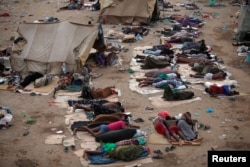U.N. Secretary-General Antonio Guterres says he is heartbroken over the drowning of dozens of migrants off the coast of Yemen.
Smugglers forced nearly 300 migrants from Ethiopia and Somalia overboard from two separate boats Wednesday and Thursday.
The International Organization for Migration says at least 56 migrants drowned, with many of them buried in shallow graves on the beach in Yemen’s southern Shabwa province by survivors.
At least 65 are missing, and those who survived and chose not to remain on the beach have disappeared.
Pathways to legal migration
A Guterres spokesman said Thursday the U.N. chief stresses that the international community must make it a priority to prevent such crises that cause the mass movement of people and exposes them to danger.
“We must also increase legal pathways for regular migration and other credible alternatives to these dangerous crossings for people in need of international protection,” the spokesman said.
U.N. migration officials are providing emergency food, shelter and medical aid to those who survived and stayed on the Yemeni beach.
They say they are shocked to find that the average age of those who drowned was 16.
The smugglers, often heavily armed, are afraid to get too close to land because they believe authorities are waiting for them, so they force the migrants into the sea.
“So the migrants had a choice. They would either be harmed more than they probably had been on the journey, shot, or go jump into the sea. Some were actually physically pushed as well,” IOM spokeswoman Olivia Headon told VOA.
Headon said it is unlikely the smugglers would ever be caught.
Thousands flee to Yemen
About 55,000 migrants have arrived in Yemen from the Horn of Africa this year, hoping to find work somewhere in the oil-rich Persian Gulf.
After arriving they try to move on quickly from Yemen, one of the world’s poorest countries, which also is wracked by violence, including airstrikes by a Saudi-led coalition fighting Houthi rebels.
About 80 percent of Yemen’s people are in desperate need of food and medical care, and the country also in the midst of a cholera outbreak.
Lisa Schlein, Salem Solomon and Margaret Besheer contributed to this report.





